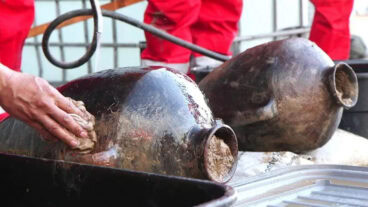
Violent storms across the region last week wreaked havoc with scores of archaeological sites along Israel’s coast, but also uncovered an ancient treasure. A headless, armless statue of a woman in a toga and sandals, made of white marble, turned up on the beach in Israel’s southern city of Ashkelon.
The figure was found half-buried in the sand by a resident walking near the shore. In addition to the statue, experts identified pieces of a mosaic floor from what’s thought to have been a Roman bathhouse.
The artifacts are part of a cliff side archaeological site that collapsed when high winds and waves hit the shore, the Israel Antiquities Authority said.
The statue stands about four feet tall and weighs about 440 pounds. It is thought to date back to the Roman occupation of what was western Judea, between 1,700 and 2,000 years ago.
An article in the local Hebrew daily Haaretz says that the statue “was apparently imported from Italy, Greece or Asia Minor, and may have represented the goddess Aphrodite.”
However, the statue brought little joy to Israeli archaeologists who say the storm washed away other artifacts from the site, and did serious damage to the ruins of coastal Caesarea.
The marble figure is to be placed on museum display.












